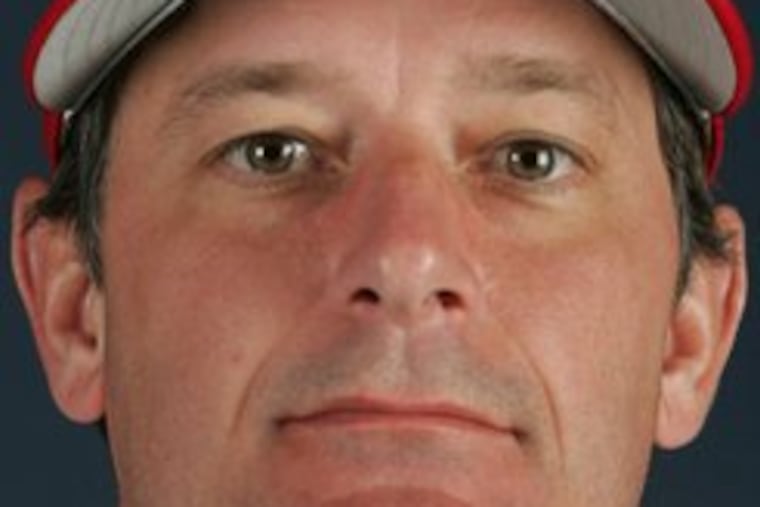Sam Donnellon | Moyer uses wits to keep Phils in reach
LATE IN HIS career, when David Cone struck out fewer batters but won more games, he said this after one ugly but productive outing: "I wish," he offered with a wry smile, "that I had this old head with that younger arm."

LATE IN HIS career, when David Cone struck out fewer batters but won more games, he said this after one ugly but productive outing:
"I wish," he offered with a wry smile, "that I had this old head with that younger arm."
This line pops into my mind at least once every time Jamie Moyer gets on the mound. And when his stuff isn't great, as was the case in last night's 8-6 Phillies win over Milwaukee, it tends to pop in there a couple of times.
At age 44, with a fastball that trickles into the low 80s and more speeds than a mountain bike, Moyer should be the funhouse ride he was last night every time he pitches. Instead, the nine-hit, five-run outing over six-plus innings was the worst of his eight starts this season, and seemingly in stark contrast with his manager's pregame praise.
"I think every game he starts," said Charlie Manuel, "you get that real good feeling that you're going to win the game."
Of the Brewers' first four hits, three were doubles that bounced off the fence. The other, by ex-Phils catcher Johnny Estrada, went over the leftfield wall.
And yet when the fourth inning ended, the Phillies, via a Pat Burrell's bomb, led 2-1.
Larry Andersen has pointed out often that Moyer might not get drafted with the stuff and speed he has now. If that is indeed true, it underlines the erosion the game has undergone over the course of Moyer's 23 pro seasons, if not beyond that.
By pitching ahead, by putting the ball in play often and walking very few, Moyer is often the beneficiary of great defense, and the Brewers game was no exception. The Phillies threw two runners out at third. Jimmy Rollins and Abraham Nunez both made outstanding plays.
Cone, when he had great stuff in his early years with the Mets, would stubbornly go after strikeouts, running an inordinate number of counts to 3-2, walking himself into jams. Consequently, the defense behind him was worse than it was for anyone on that late-1980s New York staff, and - on a very good team - Cone could not crack the 14-win plateau.
Before the game, in a dissertation on why many lefthanded pitchers are doing so well this season, Manuel had lauded Moyer's ability to get ahead in counts and dictate his pitches to hitters, rather than the other way around. He spoke of his ability to move the pitch in and out rather than up and down, making the point that to really change a batter's eye level, you need to make him move his feet.
"Take the sting off the bat by running the ball more horizontally than vertically," Manuel said.
Estrada's blast, though, on a 1-2 pitch, was a direct contradiction to that, and a harbinger. J.J. Hardy's three-run home run in the fifth, coming on a two-strike count, was an even more egregious error.
"Probably elevated the ball on the second homer a little bit," Moyer said. "And to a pretty good hitter."
Still, he pitched into the seventh and left down 4-2 to baseball's hottest spring team. "I've seen him have better command," Manuel said. "But at the same time, he took us to a place where we could still win the game."
Technically, that might have been true. Statistically, it was highly improbable. The Phillies had won just one game when trailing after seven innings. And the Brewers, with a bullpen that had been infallible, had not coughed up a lead after seven all season.
But when a guy keeps your collective heads in the game, works fast, and battles every pitch no matter what he has that night or how it is unfolding in front of him . . . well, breaks seem to happen.
With the kind of arm that Moyer can only dream about, Cone learned that too late to propel himself into the Hall of Fame.
Jamie Moyer might not get there, either. But it won't be because he wasted too much God-given material.
"I don't think I had a 1-2-3 inning all night," he said. "But you have to battle. You're not going to go out every outing, have total command and make every pitch you want to make. To me that's where you have to learn how to compete. Try to utilize what you have and rely on your defense."
As he walked from the mound with one out in the seventh, Moyer gave us a glimpse of how far that philosophy extends. He engaged plate umpire Greg Gibson in a conversation that could have been a complaint session, but was exactly the opposite.
"I told him he did a good job," Moyer said. "He was consistent. I try to remember. If I feel like the umpire did a good job, I try to give them the same respect that I feel that they give me.
"I'm not asking for favors. It's just that they're back there working hard as well."
Yeah, sure, no favors.
But when you leave a good tip on your way out the door, you often get a better table the next time you come in.
*
Send e-mail to donnels@phillynews.com. For recent columns, go to http://go.philly.com/donnellon.